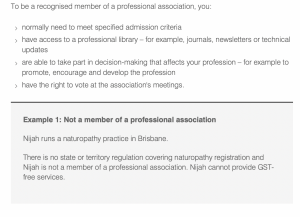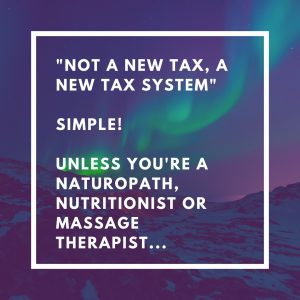Should health practitioners register for GST?
Should you register for GST? Well that depends on what type of health practitioner you are, your income and a whole lot more. Hang in there, I’ll try to make GST for naturopaths (and other non-registered health providers) as simple as possible.
Tax can be the bane of business life. Especially if you’re a one woman show, doing the accounts as well as everything else in your practice.
As a new practitioner, paying tax was the best goal my accountant ever set me. While this was in the early 1990’s, before the introduction of GST, the underlying intention is the same. Paying tax means you’re earning money. Running a viable business that meets our financial needs is the aim of most practitioners, so paying tax and becoming registered for GST is an important milestone.
Once we earn enough to be responsible taxpayers, often the next goal is to minimise it as much as legally possible! Registering for GST may help facilitate this, even if you’re still earning below the mandatory registration threshold.
What’s GST threshold for naturopaths?
Well it depends…
An income of $75,000 is usually quoted as when it’s mandatory to register for GST in Australia. But for practitioners, that’s not entirely true. This figure quoted is actually refers to GST turnover, which may differ from your overall taxable income.
Turnover is what you earn from goods and services, before tax (and all those lovely legal tax deductions).
GST turnover specifically relates to what you earn from GST applicable goods and services. If you’re a member of a GST-exempt profession, including naturopaths, psychologists and osteopaths, your income from consultations is not included in the threshold amount. But if you have other work-related income, for example from selling remedies, workshops or e-products, in most cases this is considered part of your GST turnover.
The threshold amount is only applicable to the income related to the business associated with your ABN (Australian business number). If you have an unrelated part-time job or receive rent from property, while this impacts your income tax, it’s not included in your GST turnover.
GST-exempt health services
There are 21 listed allied health services, that are currently exempt from GST. If you’re unsure if your profession meets the criteria take a look at the ATO website, or give them a call. Furthermore, the tax office states you are also required to be a member of a “nationally-based professional association” relevant to your health service to qualify. Though the ATO does not list the individual association memberships that meet their requirements for the tax exemption, or are you required to declare this when registering for GST.

While naturopathy and herbal medicine are on the list of exempt health services, nutrition is not. The oddly named ‘dietary’ is a listed service but according to the Australian Natural Therapists Association (ANTA), to be eligible for an exemption the service needs to be exactly as listed. This means a dietician is exempt from GST but a nutritionist is not. However, there are cases of individuals with bachelor level nutrition qualifications obtaining exemptions by directly contacting the ATO. It’s worth working with a tax accountant to make your case.
Massage therapy alone, doesn’t meet the inclusion criteria. But according to ANTA, if supplied as part of a listed GST-free complementary health service it can fall under the exemption. For example, if you’re a naturopath with a recognised massage therapy qualification, offering massage under the mantle of your naturopathic service is acceptable. Presumably this would mean the client’s receipt reflects this as a naturopathic, rather than massage therapy, consultation.
The downside of registering for GST
While running a business that’s profitable enough to register for GST is a worthy financial goal, there are a number of issues to consider if your turnover is below the threshold.
Paperwork: Most businesses submit a quarterly BAS (business activity statement), which means that every three months you need to be on top of your accounts. Though the time it takes to actually fill in the BAS is minimal.
Increasing some fees: While we currently don’t need to add GST to naturopathic consultations, massage therapists (and other non-exempt health services) who aren’t naturopaths, when registered for GST are required to add the tax to their treatments. Business mentoring and supervision also attracts GST.
Cash flow: if your income is irregular, it can be challenging to put money collected from GST aside to pay your BAS. Even more so, if you elect the pay as you go income tax option (to pay your estimated income tax in quarterly installments).
Being a tax collector: I’m a naturopath not a tax collector, but the introduction of GST unfortunately added this role to my job description. Some practitioners prefer to minimise their contact with government bureaucracy.
Fines for late submissions: if you’re disorganised or behind with your accounts, submitting your BAS after the quarterly deadline can result in fines for every month that you’re overdue in submitting your BAS.
It’s confusing: Just to complicate matters further, what makes a remedy attract GST often comes down to not the product itself but who sells it, where or why it’s prescribed.
For example, herbal tea is considered a food and therefor exempt if sold as beverage, but technically if your herbal tea blend is dispensed for the therapeutic actions, you’re obliged to charge GST.
Chinese medicines are even more convoluted. The ANTA website states, “a Chinese herbal medicine preparation supplied by a Chinese herbal medicine practitioner during a consultation is GST-free only if it is completely used or consumed during the consultation If the medicine is only partially used or consumed during the consultation, only that used or consumed portion that is essential for treating that patient during that particular consultation will be considered GST-free.”
Benefits of registering for GST
If your GST turnover is below the minimum, depending on your expenses and taxable income, there are some good reasons to register.
Getting back GST credits to offset your tax: Even if your business isn’t GST-registered, most of your purchases will include this tax. If you sell remedies, you’re slugged the 10% tax regardless. While the cost is passed onto your client, you miss the opportunity to also redeem it from the tax office.
Tip – take a look at your expenses over the past financial year and estimate the amount of GST you’re paying. This might include tax on clinic rental, remedies, utilities, seminars, mentoring, accountancy fees, your new computer, furniture and even the art you hang on your clinic walls. Small ticket items like tissues, magazines, flowers and other sundries can add up as well. But you can only claim this tax back if you’re registered.
Keeping on top of accounts: Before GST I tended to put the off until tax time, resulting in at least 40 hours of book work each year before visiting my accountant. Though software now makes this task a lot easier. Even if your business is small enough to do your accounts manually, the quarterly deadline means this task doesn’t take long. Being aware of your finances at all times, is also beneficial to growing your business. Tracking changes in profit each quarter is a useful tool to help maximise your income.
Corporate gigs: if you plan to offer workplace seminars, employee health checks and corporate workshops, most businesses will demand a tax invoice and expect to pay GST. While you don’t need to be registered for GST to apply for an ABN, you can only charge GST if you’re registered.
Need business help? Book an exploratory mentoring session.
What’s a tax invoice?
An invoice is the notification for payment, for goods and/or services.
If you’re registered for GST you must label this a “tax invoice” and include:
- Your name/business identity
- ABN
- date issued
- brief description of items, including quantity and price
- GST (if any) payable, either separately or if the GST is exactly one-eleventh of the total, it’s acceptable to just add ‘total price includes GST
- if the GST is not one-eleventh of the total price, you must list to what extent each sale includes GST.
If you’re not registered for GST you are not allowed to use the term tax invoice, as it’s just a regular invoice.
Source: ATO
Ultimately, the decision to register for GST if your relevant turnover is under the threshold is best made with your accountant. As our tax laws are so nuanced, it’s advisable to choose a tax professional who works with naturopaths and understands the specific requirements of our industry. If you don’t currently have an accountant, word of mouth, or asking for recommendations of industry-related forums is a good way to begin your search.
About Gill Stannard Naturopath | mentor
I work with established health practitioners and business owners, big and small, to create a balanced and sustainable career.
I’ve been helping practitioners build successful businesses, in alignment with their values, vision and lifestyle, for more then two decades.
In addition to 1:1 business mentoring and professional supervision of cancer and complex cases I run workshops and share free resources on my mentoring
In 2022 I celebrated 30 years in practice. It’s an honour to continue to serve my clients and my profession.
Disclaimer: The information provided on this website is general in nature only and does not constitute financial or legal advice. Please seek the advice of a registered tax accountant.
Similar Posts:
Social Share
2 Comments
Leave a Reply
You must be logged in to post a comment.









Pingback: Gill Stannard » Mentoring: If you find your passion, will the money always follow?
Pingback: Gill Stannard » How to transition your practice to external dispensing